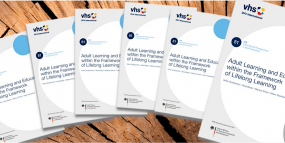Date:
Organisé par :
En savoir davantage:
La professeure Anke Grotlüschen de l’Université de Hambourg viendra présenter les résultats d’une étude internationale menée dans huit pays
Il sera possible de joindre l’évènement en personne ou en ligne. Si vous souhaitez y assister en ligne, bien vouloir communiquer avec Virginie Thériault après avoir soumis votre inscription (theriault.virginie@uqam.ca).
Résumé de la communication :
Responding to Crisis and advocating for Adult Learning and Education in the concept of Lifelong Learning. An international study with eight countries from four continents
The CONFINTEA VII conference in Marrakech 2022 revealed that adult education and learning (ALE) improved in many ways and in many countries but that ALE opportunities still do not reach those who need it most (Boeren & Rubenson, 2022). Moreover, in the Sustainable Development Goals on Education, ALE seems to disappear in the broader concept of lifelong learning (Benavot et al., 2022).
This situation led to a study, funded by DVV-International and carried out by scholars from three countries: Anke Grotlüschen (Germany), Alisa Belzer (USA), Keiko Yasukawa (Australia) and Markus Ertner (Germany). DVV-International holds offices in 30 countries around the world (https://www.dvv-international.de/en/about-us/profile). DVV-International builds it work on improving framework conditions, capacity development and implementing pilot activities on the community level. This study applies theory of macro-, meso- and micro levels of adult education and learning (Egetenmeyer et al., 2017; Tietgens, 1991), which is applied in this study.
The research questions aim at efficient strategies for the implementation of adult learning and education as well as hindering factors. Focus group and expert interviews took place with resource people from Brazil, South Africa, Ukraine, Kyrgyzstan, Jordan, India, Thailand and Australia. The method of constant comparison was applied for the interview analysis (Strauss & Corbin, 1996). MaxQDA software was used for inductive categorizing.
One hindering factor is possibly seen in the frontloaded educational systems with most of the funding addressed to children or formal school qualifications. This was found earlier in an analysis of adult education policies (Belzer & Grotlüschen, 2022) and is confirmed by our findings. A supportive factor is the existence of national associations for adult learning and education that aim at social justice and advocate for the implementation of ALE as a system. However, the data reveal a clear power relation between meso level advocacy activities (by associations, peak bodies and researchers) and macro level impact (onto educational ministries or ministries of labor). One of the policy strategies applied by the ministries is called “empty signifier” by the interviewees: Following (inter)national pressure, ministries implement policy strategies and white papers, but they do not add funding or budget.
The inductive approach also allows to see how micro-level answers emerge as an effect of being underserved for decades. This shows that people do not trust in the regular policy-making process anymore. Individuals and communities use civil disobedience, self-help groups and community-based activism in order to overcome ecological disasters, food insecurity due to lockdowns, war and refugees, gender-based violence and many other disastrous experiences where they feel left alone by their governments.

